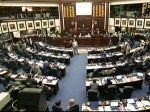Via HCMA, SGR Advocacy Alert from the AMA – – – – The negotiations between Speaker Boehner and President Obama on the Lame Duck tax and deficit reduction package are at an impasse. There is a very real threat of the 26.5 percent Medicare physician payment cut taking effect on January 1, 2013, at least temporarily.
If Congress does adjourn without addressing the payment cut being induced by the sustainable growth rate (SGR) formula, the Administration announced today that the Centers for Medicare and Medicaid Services will follow normal claims processing procedures.
That is, claims will not be held and Medicare carriers will process payments for physician services provided after December 31 under the normal 14-day cycle required by law. Payment for these claims would be based on the new, lower fee schedule conversion factor of $25.0008, as opposed to the current rate of $34.0376.
At this time, it is impossible to predict whether the 112th Congress will find a way to pass a stop-gap measure before adjourning, how long such a measure would last, or how long payment cuts will be in effect before legislation can be passed after the 113th Congress convenes in January. It is highly unusual for a new Congress to enact significant legislation in the first month of its session, but the circumstances facing our nation today are far from typical.
It is inexcusable that Congress is once again putting the 47 million Medicare patients and the practices of physicians who provide them needed health care at significant risk. The Medicare program has become unreliable and its instability undermines efforts by physicians to implement new health care delivery models that stand to improve value for seniors and other beneficiaries through better care coordination, chronic disease management, and keeping patients healthy.
The AMA believes that the financial disruption this situation will cause for physicians and their practices is unacceptable, and we will continue to fervently convey this message in the strongest possible terms to Congress and the Administration, as we have for the past several weeks. Our patient and physician grassroots networks have been activated, and we are seeking your voices to tell Congress just how deeply its inaction will affect you.
Despite these efforts, at this time we feel compelled to advise physicians to start making plans for steps they can take to mitigate this disruption and meet their own financial obligations in January, in case the 26.5 percent cut actually takes effect. Given the potential impact on practice revenue in early January, physicians should be certain adequate arrangements are in place to sustain their practices. For those physicians who are forced into the untenable position of limiting their involvement with the Medicare program because it threatens the viability of their practices, we urge that patients be notified promptly so that they, too, can explore other options to seek health care and medical treatment.
![]() By: Jeff Cohen
By: Jeff Cohen






